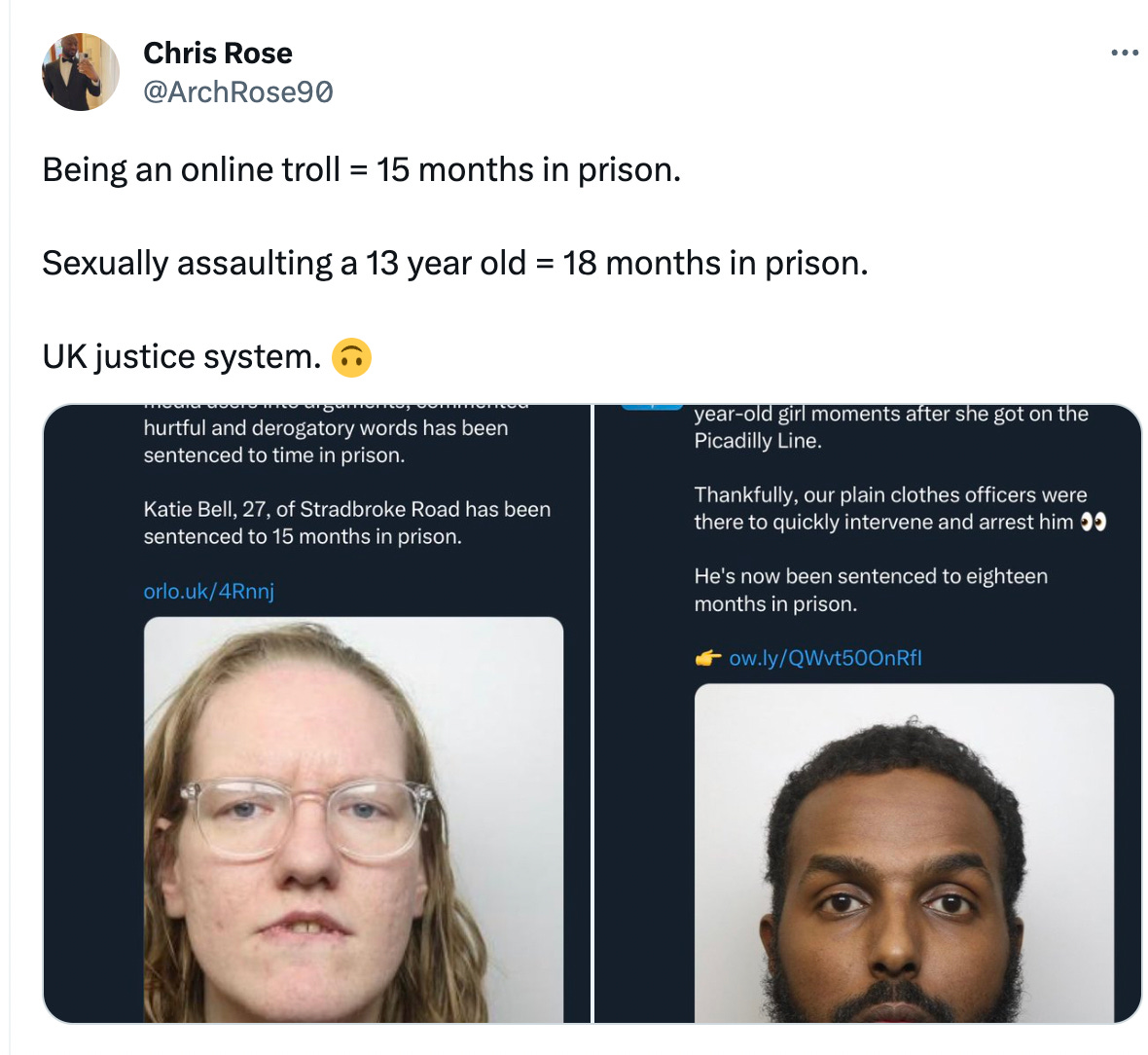Addressing Important Social Issues Requires Caring About What is True
The cases of Katie Bell and Abdulrizak Hirsi

When venturing tentatively onto Twitter this morning, I encountered this tweet.
This might seem compelling at first glance (as long as it matches your own perception of power balances in society) but that is precisely why first glances should be followed by closer looks. The details of these same two cases presented to someone with a very different ideological narrative and thus a different motivation for the which details they select and how they arrange them, could equally plausibly produce this:
Police drag Black man off train claiming he looks like he might be about to touch a girl. 18 months. Dangerous pervert
White woman wages six year campaign of terror. Destroys lives and businesses. Multiple warnings, restraining orders, suspended sentence. 15 months. Damaged lonely young woman.
UK justice system
This is what you can do with the details of so many events, should you be somebody inclined to take an ‘alternative facts’ approach to truth to make it fit your own ideological narrative. These two cases can be said to prove both that we live in a society where Muslim men get a slap on the wrist for child sexual assault while white women can go to jail for tweeting and that we live in a white supremacist society where black men can be manhandled and jailed just for looking suspicious while white women can spend years destroying lives before anybody intervenes.
Of course, these two cases prove neither of these things because Katie Bell and Abdulrizak Hersi are not symbols of your deepest fears about the state of society. They are twisted individuals who need to be in jail. Issues of freedom of speech, grooming gangs, racial bias and police brutality need to be addressed seriously with empirical research and the aim for objectivity. The cases of Bell and Hirsi have no relevance to any of them.
Katie Bell, according to numerous sources, is a 25-year-old woman with borderline intelligence and autism who derives satisfaction from targeting the victims of tragedy, crime and bereavement with malicious messages glorying in their loved one’s suffering and death. She was charged with regards to two victims whom she targeted over the course of six years, sometimes sending 60 messages a day giving them cause to fear for own safety and that of their grandchildren. This continued despite warnings, restraining orders and a suspended sentence.
(from Yorkshire Live)
Ms Bell’s first victim was a chocolate shop owner, Mrs Childs, who made the mistake of suggesting she stop wishing for the worst possible outcomes in the case of a missing person as this is likely to be quite upsetting to their loved ones. This resulted in Mrs Childs becoming Bell’s target. She spent years fearing for her life and that of her family following messages indicating that Bell knew of the existence of a grandchild whom she wished to die in a fire. During this period, Bell also targeted the chocolate shop’s social media making Mrs Childs afraid to use it for business purpose.
The second victim was Tracey Patterson, the widow of kickboxer, Barrington Patterson. Mr Patterson, an ex-gang member turned anti-gang mentor, was a much-loved figure on account of this work, his martial arts and the homelessness charity he ran with his wife. It was on his death of a heart attack that Bell began targeting Mrs Patterson to taunt her about it. This followed much the same pattern as the stalking of Mrs Childs with the result that Mrs Patterson lived in such a state of terror that she did not leave her house for fourteen months and the homelessness charity was forced to close. Describing her visit from police to advise her on how to escape the house in the event of petrol being poured through the letter box. Mrs Patterson asks,"Can you imagine the fear and terror we lived in waiting for that to happen?”
Probably not, fully, but the details of Bell’s actions moved me from a starting position of :”Is the criminal justice system denying Ms. Bell’s freedom of belief and speech?” to “What went so badly wrong that she was not stopped sooner?”
There is less detail on the case of Abdulrizak Hirsi, but he is reported as having a history of sexual offending and previous arrests including for grabbing a woman by the hips and rubbing his penis against her on the London underground. On this occasion, fortunately, he was prevented from assaulting the girl (who is reported to be 12 or 13 in different outlets). Plainclothes transport police had observed his suspicious body-language and close proximity to the girl and moved in to investigate, at which point they were able to see that his penis was exposed. They removed Hirsi from the train before the girl or her parents were aware that anything was amiss. They were informed of this later, so it is to be hoped the young girl suffered no trauma as result.
Other victims of Hirsi did know what he was doing and are very likely to have experienced fear with lasting effects. There may well be others whom Hirsi assaulted who remain unaware of it. He is believed to have been an administrator of an international forum of ‘frotteurs’ who rub their exposed penises on women in buses and on trains. On this forum, the offenders, who refer to themselves as “chikans” describe and plan their assaults to each other facilitated by Mr. Hirsi in London and other sex offenders all over the world.
Frotteurism is a paraphilia that is usually only treated by psychologists in that field when an individual has committed sexual offences. This has limited success. Paraphilias are persistent and treatment usually involves addressing offending behaviour and treating related disorders. However, there is also a secretive subculture of sex-offenders who engage in frotteurism and communicate with and incite each other online. This criminal subculture emerged in Japan, which is where the term ‘Chikan’ comes from. It still has its strongest presence there, but exists internationally and is known to have a presence in London. These assaults are occasionally reported by women, but because the intention of the “Chikan” is to get into a crowded train or bus where he hopes to be able to rub himself against women without being detected, most of it comes from discovered forums, such as the one administrated by Hersi.
Although Frotteurism is considered a ‘minor’ assault due to its target usually being unaware of it, the obsessive nature of it as a paraphilia means it is persistent. Hersi’s previous arrests for the same behaviour reflect this. That he is alleged to administrate a Chikan forum suggests he has no intention of stopping. These two factors and the fact that he used force in his assault of the woman he grabbed by the hips indicates that he is a persistent and potentially violent sex offender.
The information above is all I have been able to gather on these cases and perhaps there is more that would present either of them in a different light. At present, however, it would clearly be absurd to consider Katie Bell a symbol for the cause of free speech or to associate Abdulrizak Hersi with Pakistani grooming gangs. He fits into a different collective of sexual offenders with different methods that needs to be addressed on its own terms. Hersi could not be said to be a victim of police racism or brutality and, while Bell was shown considerable leniency in the past, the reason for suspending her sentence was her intellectual disability and autism. These two individuals don’t fit within Culture War narratives and jamming them in with misleading information and ideologically motivated details for comparisons will only exacerbate it.
Exacerbating the Culture Wars is, of course, something that far too many people actively seek to do. This is why I did not address this tweet on Twitter. While some people would look at the details and adjust accordingly, more would have taken my attempt to introduce reality into the ideological narrative as my allegiance to a different ideological narrative. As I did not want to lose the day to accusations of ‘anti-whiteness’ or indifference to freedom of speech or have it assumed that I either do not know or do not care that the police have been investigating people for tweets (usually gender critical ones) or that they failed to investigate child abuse gangs in Rotherham for fear of being thought racist, I thought it better to write here. Similarly, any attempt to show how different details of same two cases could very easily be used as evidence of a common and contradictory claim about the problem with the UK justice system would only be likely to have me accused of “bothsidesism” and my allegiance to that ideological narrative assumed confirmed.
If you are somebody who genuinely cares about the state of the UK justice system or about freedom of speech and the safeguarding of children or any other of the pressing issues in society today, please do not do this. We cannot address anything by waging in wars of ideological narratives. We must care about what is true and focus on reality. If you see a post on social media that confirms your own perception of a problem, take the time to look into and see if it really does do that. You owe it not only to the state of public discourse to do this but to yourself.
John Stuart Mill argued that denial of freedom of speech wronged not only the speaker but the listener, because,
If the opinion is right, they are deprived of the opportunity of exchanging error for truth: if wrong, they lose, what is almost as great a benefit, the clearer perception and livelier impression of truth, produced by its collision with error.
I think that can be usefully repurposed as a personal principle in the age of social media. If we remain locked within our own ideological bubbles seeing only what we already believe to be true, and never scratching beneath the surface, we deny ourselves the opportunity to find out if something we believe is not true and the ability to have confidence that the ideas we hold are true.
Addressing important social issues requires caring about what is true.








Excellent reminder to read past the headlines (or tweets) and dig deeper before jumping to conclusions. Thank you.
Unfortunately finding out what is true takes effort and the ability to understand subtleties and nuance which most people are not inclined to do. This thoughtful essay could never be reduced to a tweet. I've never been a participant on Twitter but have participated in my share of argumentative threads on different platforms and on every topic under the sun. Better to leave that behind. It's not good for ones mental health and doesn't solve anything.